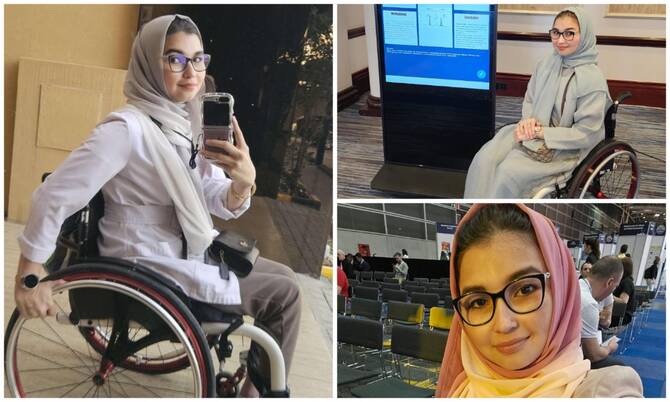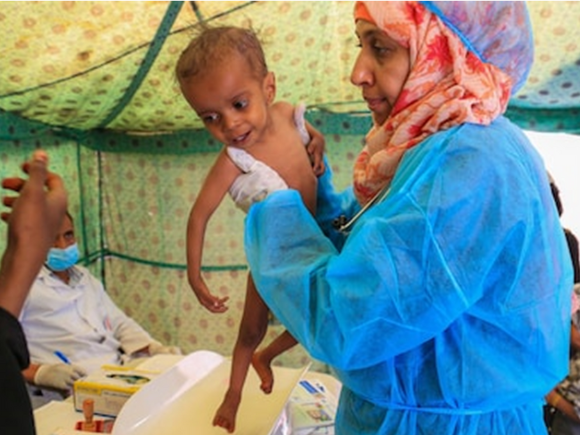Dr. Bashair Ibrahim is a symbol of hope, a testament to the strength of the human spirit, and a living example of perseverance.
Her story of overcoming disability is an inspiration to anyone who has faced adversity.
Ibrahim spoke to Arab News about how she navigated a challenging career, fueled by unwavering determination and a profound passion for healing.
“One of the most rewarding aspects of working as a pediatrician is the opportunity to care for children, especially at such a young age when they haven’t yet formed judgments or perceptions about disability,” Ibrahim said.
“I find that my connection with them is pure and genuine; they see me for who I am, not for any physical limitations. We build trust and warmth in a very natural way.”
Ibrahim’s journey, marked by both triumphs and systemic barriers, offers a vital perspective on inclusivity, accessibility, and the importance of challenging societal norms.
Her interest in medicine was sparked early, spending time around medical equipment due to mobility challenges.
“As a result of being in a car or using a wheelchair, I started to see a lot of machines, a lot of devices, X-rays, devices they use, needles,” she explained.
This ignited curiosity, leading her to explore the intricacies of the human body and medical science. This was not a deterrent; it fueled her path to healing.
“These experiences from a young age make one stronger,” she said.
Her fascination with science continued, and she began volunteering for lab activities — excelling in biology. This early experience combined with an interest in medical dramas solidified her career aspirations. The allure of understanding the human body and alleviating suffering proved irresistible.
“I liked the science itself,” she recalled. “I was learning more about humans, about how organs work, what diseases can come from that.”
Applying to medical school presented hurdles. Many universities lacked accessibility for individuals with mobility impairments.
She recounted a disheartening experience at one university where the main entrance was only accessible via a long staircase.
Despite finding an alternative route, the dean still denied her access citing concerns about opening hours.
This highlighted a frustrating reality: systemic biases can hinder progress, even when solutions exist.
Undeterred, Ibrahim sought admission to another private university. The director made a comment that stuck with her, asking: how would a patient treat a patient?
For Ibrahim, this dismissive remark is one example of societal biases surrounding people with disabilities in healthcare.
It underscored the need to challenge preconceived notions and recognize potential regardless of physical limitations.
“It never made sense then, it doesn’t make sense now,” she said, emphasizing the enduring impact of prejudice.
Despite these obstacles, Ibrahim remained committed. She specialized in pediatrics, driven by a deep-seated desire to positively impact children’s lives.
“What also makes this work deeply meaningful is the respect I often receive from families,” she explained.
“Many parents have told me they admire the way I’ve pursued a career in medicine despite the challenges that come with having a disability.
“Their appreciation reminds me that I’m not only helping their children medically, but also offering a visible example of resilience and determination.
“That mutual respect, and the human connection it fosters, is something I treasure deeply in my work.”
Ibrahim is acutely aware of misconceptions surrounding doctors with disabilities.
“One of the biggest misconceptions about doctors with disabilities is the stereotype that we are limited in our ability to practice medicine effectively,” she noted.
“I often notice surprise when families meet me for the first time, but I see that as a chance to challenge those assumptions through my work.”
She has adapted her approach to ensure her disability does not compromise care quality.
“I perform the full physical examination while seated, and I’ve adapted my approach to ensure that nothing is compromised in the quality of care I deliver.
“Over time, families come to see that my disability doesn’t define my capability.”
She believes that mentorship is crucial for aspiring medical professionals with disabilities, emphasizing the importance of role models who understand both the clinical demands and personal challenges they face.
Her message is clear: equal access, thoughtful accommodations and representation are essential, and her story is a testament to how people can overcome barriers and achieve their full potential.
source/content: arabnews.com (headline edited)
_____________

Dr. Bashair Ibrahim overcame prejudice and lack of accessibility to achieve career success. (Supplied)
_________________
SAUDI ARABIA
